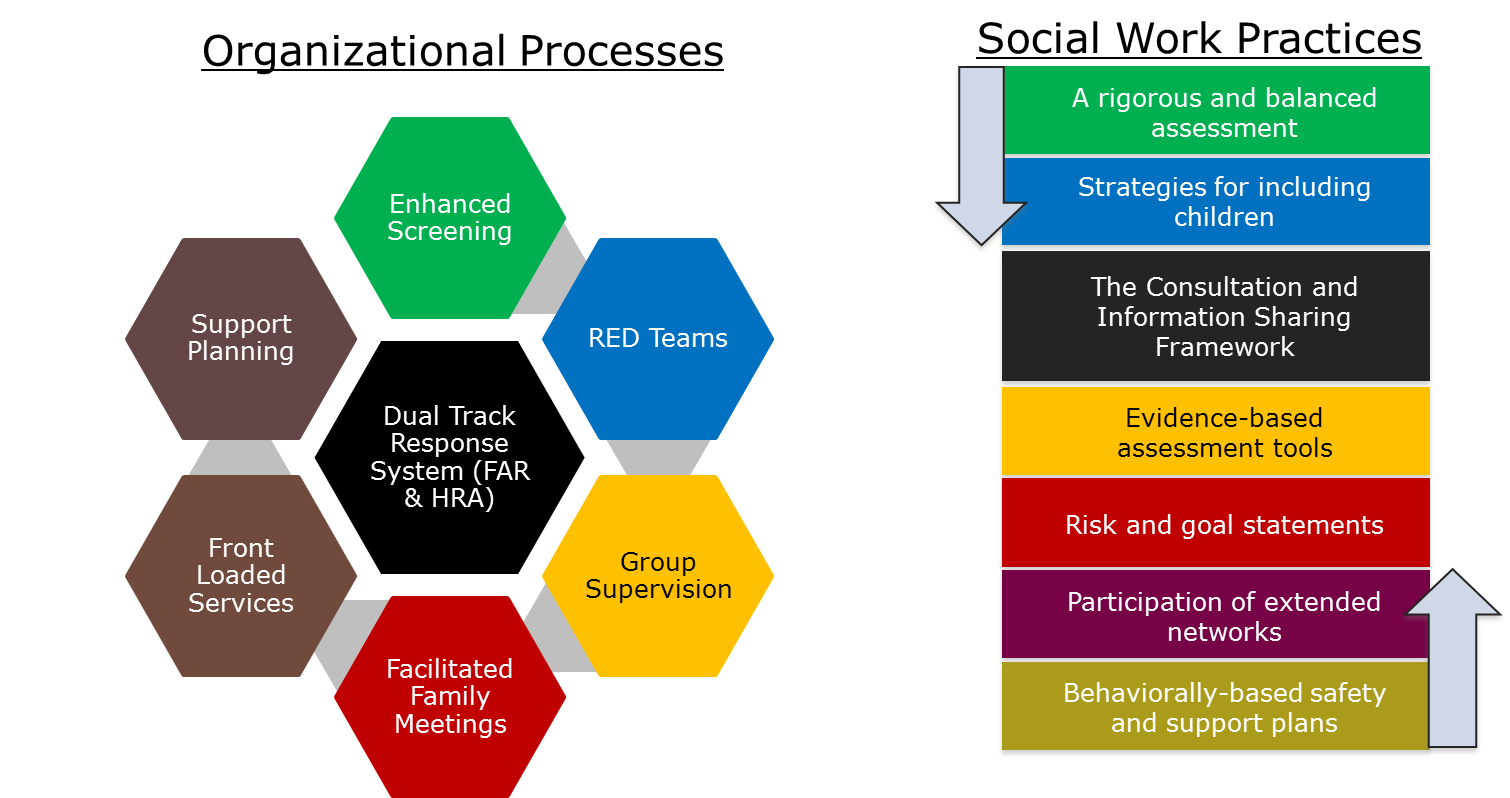Differential Response Program
Differential response (DR) is the overarching paradigm shift in counties to assess children for safety through partnering with families, community partners, and facilitate sustainable behavioral change within a family. There are seven organizational processes and seven social work practices contained within the DR (See model below).
Within DR a multi-track assessment approach can by used. One track called Family Assessment Response (FAR) for low to moderate risk referrals can be offered as alternative to the traditional investigative approach, High Risk Assessment (HRA). These tracks are only for accepted reports of child abuse and neglect by counties who have completed the required training and been approved by the Executive Director. FAR may be utilized to assess child safety by focusing on the environmental context and broader issues of family well-being, along with the incident of abuse or neglect, through the solution focused family centered practice supported by DR. The labels of perpetrator and victim are removed and the determination, or finding, that is often required by statute is not required in DR.
DR provides more options to counties without removing any aspects of current practice. A rigorous and balanced assessment of concerns and strengths of each family will need to be assessed in all accepted referrals. Case workers will still focus on what occurred and the impact on the child using the Colorado safety and risk assessments and follow all timelines and policies in Volume 7 and C.R.S. 19. Accepted referrals with initial high risk will continue to be assessed the same way as always and findings will still be made on all HRA referrals. At any time the safety of a child becomes untenable to maintain in a FAR case it can be track changed to an HRA assessment/case. Court involvement can be utilized at any time it is appropriate via this same track change process. DR does not limit the authority of a caseworker to provide safety for a child whether it be partnering with law enforcement, the judicial system, or community partners.
DR has been designed to be more flexible in responding to child abuse and neglect reports, recognize that an adversarial focus is neither needed nor helpful for all cases, understand the family issues which lie beneath maltreatment reports, and engage parents effectively to utilize services that address their specific behavioral needs. Preliminary research has shown an increase in caseworker satisfaction, an increase in family engagement and an increase in community partner satisfaction with DR. DR does not limit or remove any current case work practices, only adds flexibility to match the needs of the family and ensure safety of the child.
Read the full research results
Summary of the results:
- FAR and HRA assessments manages safety of the children equally as well.
- There appears to be lower recidivism if a family's first interaction with child protection is a FAR assessment.
- Families who had a FAR assessment reported being more engaged with child protect as compared to families receiving an HRA assessment.
- Caseworkers reported FAR families were more likely to have material needs and mental health needs met than were HRA families.
- FAR families were more likely to rate satisfaction with their caseworker as high.
- Caseworkers reported FAR families were more likely to show improvement in cooperation, receptivity to help, engagement, and a reduction in difficult behaviors.
- Caseworkers and supervisors reported a slightly positive level of satisfaction concerning their child welfare jobs and reported that they are somewhat more likely to stay in the field because of the introduction of DR in Colorado.
(1) Winokur, M., Ellis, R., Orsi, R., Rogers, J., Gabel, G., Brenwald, S., Holmquist-Johnson, H., &,Evans, M. (2014). Program evaluation of the Colorado Consortium on Differential Response: Final report. Fort Collins, CO: Social Work Research Center, School of SocialWork, Colorado State University.
